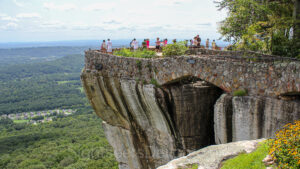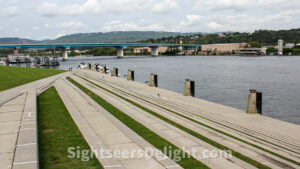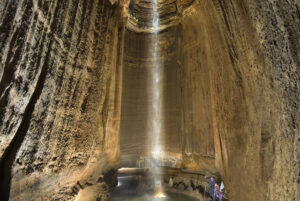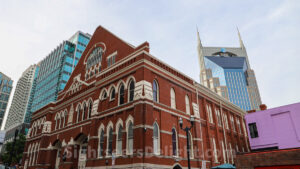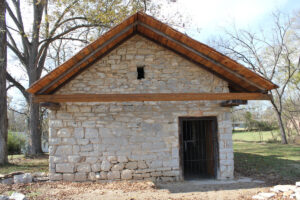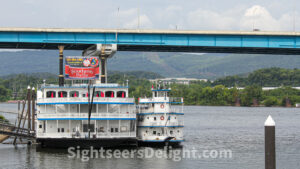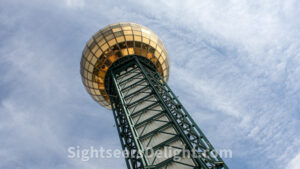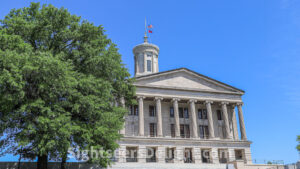What is today Rock City has been a popular tourist attraction for years. But, it was until the 1930s that the Rock City of today began taking shape. Frieda Carter, whose husband, Garnet, fashioned one of the country’s first miniature golf courses and a housing development atop Lookout Mountain, built a walkway and rock garden for the people living in the development. To promote the new attraction, which officially opened on May 21, 1932, Carter’s husband hired Clark Byers to paint farmers’ barns – for free, if the barns’ owners would let him paint “See Rock City” on the roof. The campaign worked; the slogan not only helped to draw guests to Rock City, it also became one of the most recognized advertising tag lines of all time. Today, Rock City features winding, garden-lined trails. But, the highlight is Lover’s Leap, a natural overlook where travelers can supposedly see seven states from one spot.
30750
The popular Ross’s Landing sits below the Tennessee Aquarium along the south shore of the Tennessee River. The park is home to a river pier, a marina and a natural amphitheater. The green space is home to several festivals and outdoor concerts. The landing, listed on the National Register of Historic Places, is the last site of the Cherokee’s 61-year occupation of Chattanooga. It is named for John Ross, who served as the Cherokee Nation’s principal chief and is considered to be the embarkation point of the Cherokee removal on the Trail of Tears.
37402
In the 1920s, Leo Lambert thought Lookout Mountain Cave would make a great tourist attraction. Once used as a hideaway for outlaws, refuge for Native Americans and a hospital during the Civil War, a railroad tunnel built in the early 1900s intersected the cave’s entrance and sealed it from the public. But that didn’t deter Lambert from searching for the cave. In 1928, he led a team of engineers and started digging an elevator shaft to access the cave. Ninety-two days later, Lambert found the cave, but not before digging through more than 400 feet of solid limestone. But when Lambert realized there might be more than just a cave buried beneath Lookout Mountain, he took off down a tight corridor, and 17 hours later, he found what today known is as Ruby Falls.
37409
Thomas Ryman was a riverboat captain when he went to see popular revivalist Samuel Porter Jones address a crowd in Nashville. With plans to heckle Jones, Ryman instead emerged a changed man and decided to build a tabernacle where Jones could speak to large crowds. In the ensuing years, dozens of famed musicians, politicians and performers have appeared on the auditorium’s stage – from President Teddy Roosevelt to Harry Houdini to Charlie Chaplin. But, the “Mother Church of Country Music” is perhaps best known for its three-decade run as the host of the Grand Ole Opry. While the auditorium – located in the heart of downtown Nashville – eventually fell into a state of disrepair, this National Historic Landmark has been revitalized and transformed into one of the most famous music venues. The Ryman still regularly hosts concerts and is open during the day as a museum.
37219
A stone cabin on this site is said to be stone blockhouse of the Valentine Sevier Station. On Nov. 11, 1794, Native Americans attacked the outpost, killing six; a seventh was scalped, but recovered. Valentine Sevier was a brother of Tennessee’s first governor, John Sevier.
37042
The Southern Belle Riverboat operates sightseeing trips along the Tennessee River. The Southern Belle offers a variety of daily cruise options on its 450-passenger vessel built in 1985.
37402
37129
The Sunsphere is the centerpiece of World’s Fair Park and is a symbol of Knoxville, Tenn. The tower is one of two buildings that survived the Fair. Substantive redevelopment of the 67-acre Fair did not materialize for many years. Though it was underutilized for most of its post-show life, the tower is today home to an observation deck, an event space and a restaurant and bar.
37902
The Tennessee Central Railway Museum is named for a railroad that traces its history to 1884 and operated until 1968. At its prime, the Tennessee Central Railway operated trains over a roughly 248-mile stretch of track running from Harriman, Tennessee, to Hopkinsville, Kentucky, passing through cities such as Clarksville, Tennessee, along the way.
37210
The Tennessee State Capitol, home of the Tennessee legislature and the governor’s office, is a National Historic Landmark. Designed by architect William Strickland, it is one of Nashville’s most prominent examples of Greek Revival architecture. It is one of only twelve state capitols (along with those of Alaska, Delaware, Florida, Hawaii, Louisiana, Nebraska, New Mexico, New York, North Dakota, Ohio, and Virginia) that does not have a dome.

